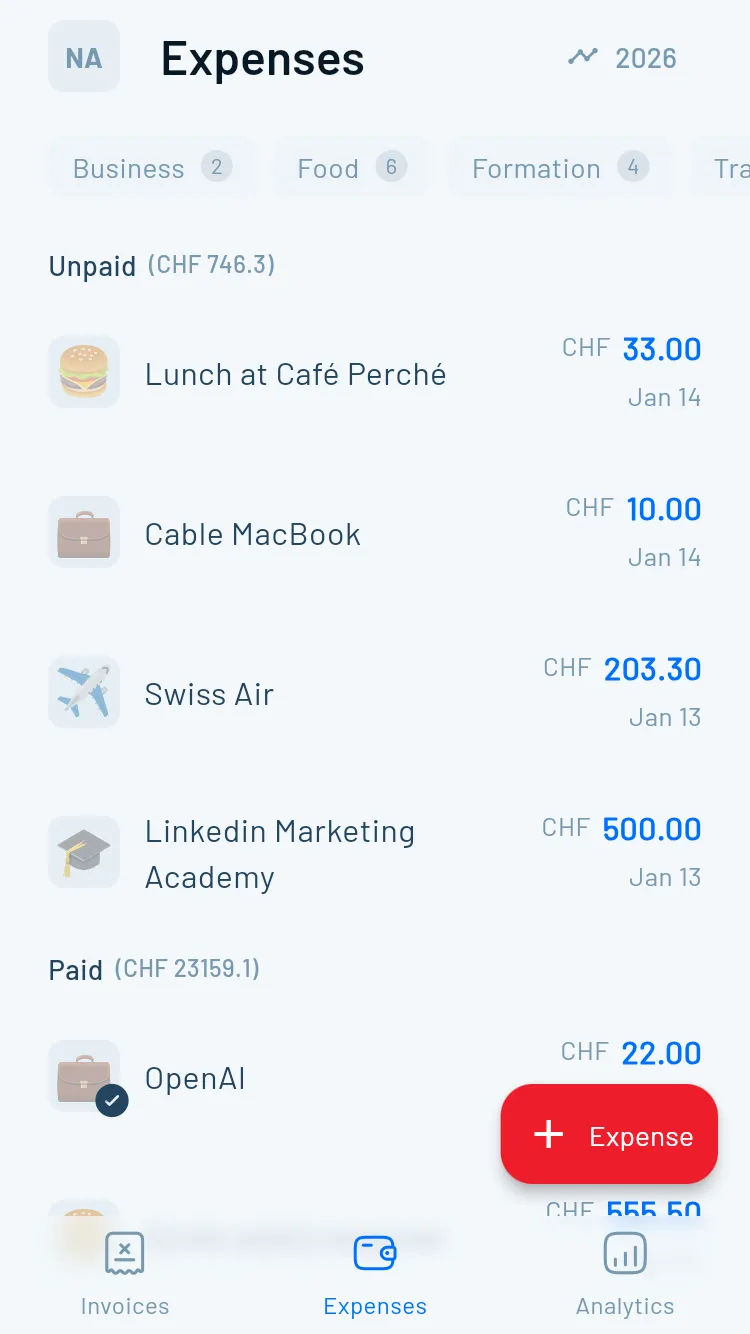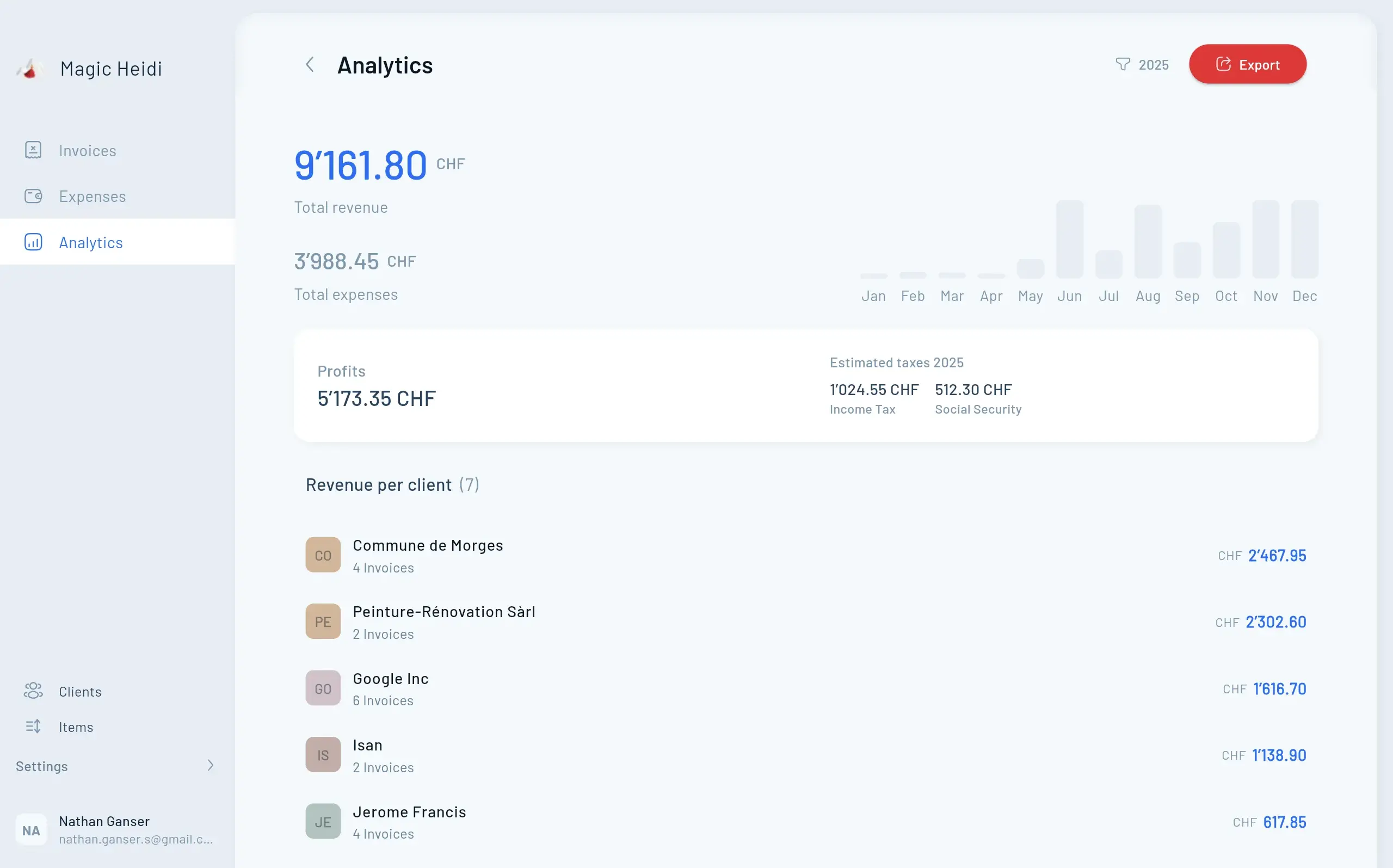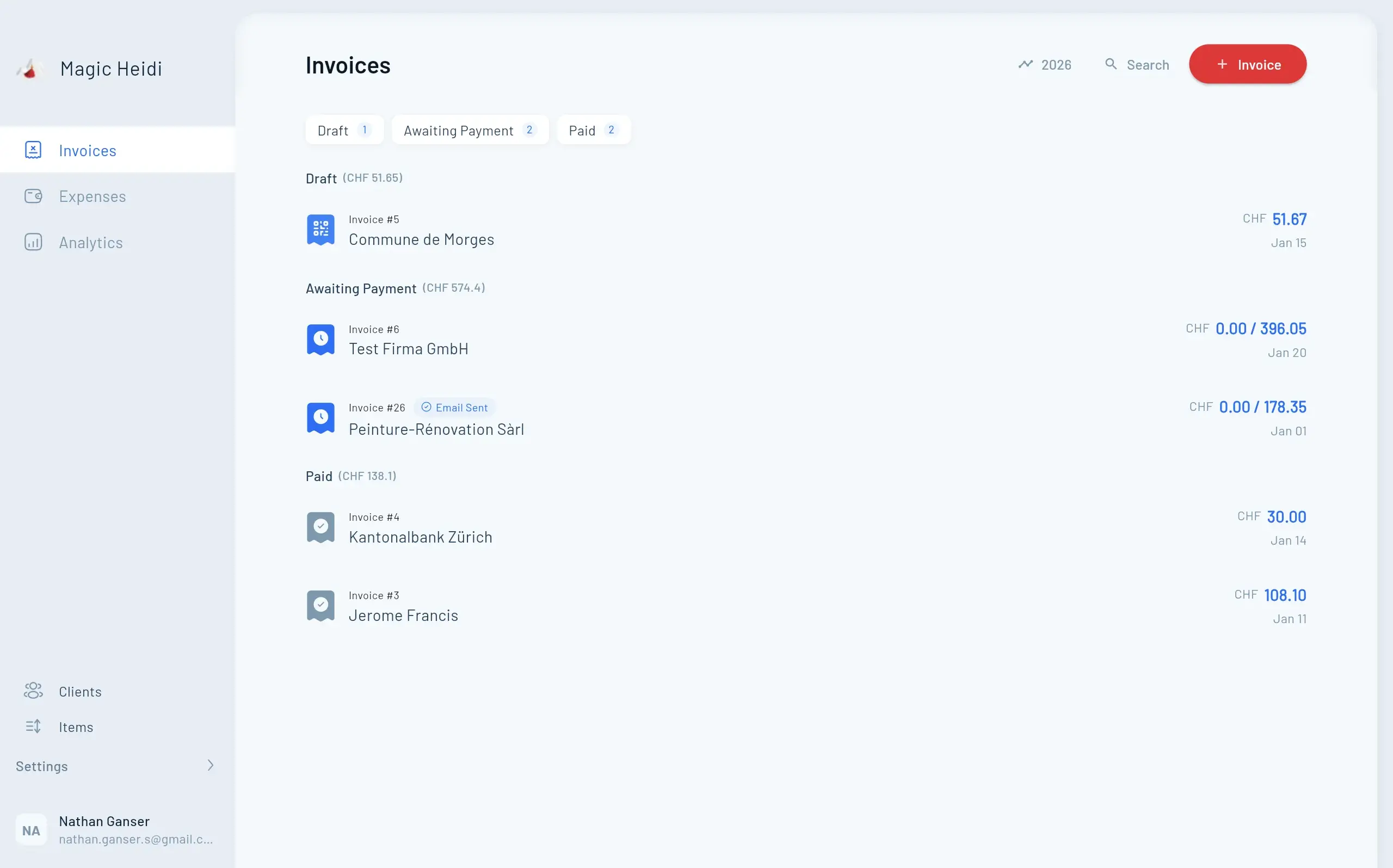Top-notch—simple, clear, and the support is exceptionally fast and very helpful. The invoices look great.
Verified User
Managing finances as a Swiss freelancer shouldn't feel like a second job. The right financial management software transforms your business—and gives you back your time.
CHF 1,783.65 received
AI extracted CHF 42.50
With 25% of Switzerland's workforce now freelancing, the demand for comprehensive financial management solutions built specifically for Swiss self-employed professionals has never been higher. Generic accounting software designed for corporations won't cut it.
VAT registration kicks in at CHF 100,000 turnover. QR-bills are mandatory with new technical requirements coming November 2025. Below CHF 500,000, you can use simplified 'Milchbüechli' accounting—above that, full double-entry is required. Generic software rarely handles these out of the box.

Every invoice you send to Swiss clients needs a proper QR-bill. Magic Heidi generates these automatically, ensuring compliance with the latest technical standards—including the November 2025 structured address requirements.
Automatic formatting that stays compliant
CH/LI prefixes handled correctly
Regulations change, your invoices adapt
Work with international clients seamlessly
Magic Heidi
CHF 500
Jan 29
Webbiger LTD
CHF 2000
Jan 24
John Doe
CHF 600
Jan 20
Digging through shoeboxes of receipts before tax season? That's time you'll never get back. Snap a photo—Magic Heidi's AI extracts the date, amount, VAT, category, and vendor automatically. No more manual data entry. No more shoeboxes of receipts.

Manual transaction entry introduces errors and wastes time. Connect directly to your Swiss bank accounts, import transactions, and match them to invoices or expenses automatically. Real-time visibility into your cash flow without lifting a finger.

Not all accounting software serves freelancers equally. Here's what Magic Heidi delivers:
Every invoice includes proper QR-bills that meet Swiss compliance standards—including the November 2025 requirements.
Modern expense tracking uses AI to scan receipts and categorize expenses automatically.
For freelancers approaching or exceeding the CHF 100,000 threshold, VAT tracking becomes critical.
Many freelancers convince themselves spreadsheets are 'free.' They're not.
At CHF 100/hour, 200+ hours of bookkeeping equals massive lost earning potential annually.
Swiss freelancers spend an average of 81 hours annually on tax preparation alone.
Manual mistakes compound: wrong filings, cash flow surprises, lost deductions, audit complications.
Switzerland's multi-level tax system makes DIY approaches risky with potential penalties.
Magic Heidi was built by Swiss freelancers who understood that existing solutions were either too complex or missing critical local features. Your data stays in Switzerland—not overseas data centers with different privacy regulations.
Compliant with 2025 requirements
8.1%, 3.8%, 2.6% built-in
Swiss bank compatibility
DE, FR, IT, EN support
See why Swiss-specific features matter more than you think.
| Feature | Magic Heidi | International Software | Spreadsheets |
|---|---|---|---|
| Price/Month | CHF 24.99 | CHF 40+ | Free |
| QR-Bill Compliance | ✓ Auto-generated | ⚠ Manual setup | ✗ Not available |
| Swiss VAT Rates | ✓ Built-in | ⚠ Manual config | ✗ Manual |
| Swiss Bank Import | ✓ Automatic | ⚠ Limited | ✗ Manual |
| AI Receipt Scanning | ✓ Included | ⚠ Extra cost | ✗ No |
| Data Location | ✓ Switzerland | ✗ Overseas | ⚠ Your device |
| Time to Learn | 5 minutes | Hours | Weeks |
Consolidating your financial tasks into one platform delivers measurable advantages:
Automation eliminates repetitive tasks. Manage everything from a single dashboard.
Built-in calculations and automatic categorization remove human error from the equation.
Know exactly where your business stands at any moment. Make smarter decisions faster.
Generate reports instead of reconstructing twelve months of financial history.
Automated reminders reduce delays. Some freelancers get paid 2-3 weeks faster.
iPhone, Android, Mac, Windows, and web—your finances are accessible wherever you are.

Transitioning from manual methods to accounting software doesn't have to be painful.
Most software allows importing existing client lists, expense categories, and transaction history. This creates a baseline for comparison and ensures continuity in your records.
Send all new invoices through your software. Scan receipts immediately instead of collecting them. Check your dashboard weekly to catch any categorization issues early.
Once comfortable with basics, explore additional functionality: automated payment reminders, financial reports, tax estimation tools, and integrations with other business software you use.
Real feedback from real users managing their finances with Magic Heidi.
Top-notch—simple, clear, and the support is exceptionally fast and very helpful. The invoices look great.
Verified User
Very practical and time-saving—easy to use, good graphics, and the analytics provide a good overview.
Verified User
Finally, accounting software that understands Swiss requirements. QR-bills work perfectly every time.
Freelancer, Zürich
If you send more than a few invoices monthly or want to claim business expenses on your taxes, yes. The time savings alone justify the cost, and proper record-keeping protects you during audits.
CHF 100,000 in annual turnover. Once you exceed this, you must register with the Swiss Federal Tax Administration and charge VAT on your services.
You can, but you'll likely encounter issues with QR-bill compliance, Swiss VAT rates, and bank integrations. Swiss-specific solutions handle these requirements automatically.
Swiss law requires retaining all business documents for a minimum of 10 years. Digital storage counts, making cloud-based accounting software an ideal solution.
Below CHF 500,000 annual turnover, you can use simplified accounting (income/expense statements). Above this threshold, full double-entry bookkeeping (balance sheets, profit/loss accounts) is required.
One plan. All features. Cancel anytime.
With over 326,000 active sole proprietorships in Switzerland, you're not alone. But you don't have to struggle with spreadsheets and tax-season panic. Try Magic Heidi free and see how much easier freelance accounting can be.